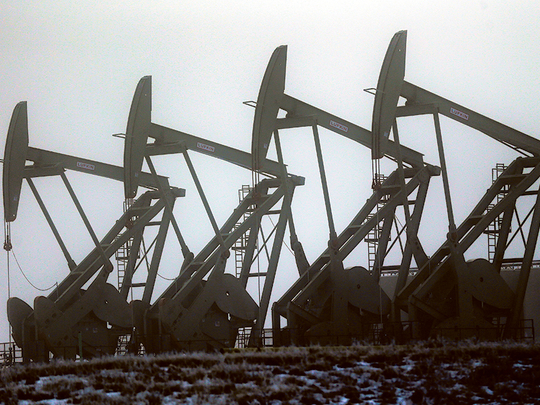
Abu Dhabi: Oil prices are likely to drop further if Iran strikes a deal with world powers over its controversial nuclear programme, energy experts said.
Brent, the international benchmark for crude oil was trading at around $55 (Dh202) per barrel on Tuesday after falling more than 2 per cent as Iran and a group of P5+1 countries held discussions in Switzerland over easing of sanctions on Iran.
Analysts said Iran oil would put downward pressure on oil markets.
“The market is oversupplied and if Iran oil is to enter the market, it would add more pressure, leading to drop in oil prices. We have to wait and see whether sanctions would be lifted fully or partially,” said Dominic Haywood, an oil analyst from Energy Aspects in London.
He said around 20 million barrels of oil are stored offshore in Iran and will be ready for shipping in a month or two once sanctions are eased.
Iran has the world’s fourth-largest proven oil reserves after Saudi Arabia, Venezuela and Canada. The country’s oil production has declined over the years due to international sanctions imposed by the US and other western countries over its controversial nuclear enrichment programme.
An important member of the Organisation of the Petroleum Exporting Countries (Opec), Iran has recently accused Saudi Arabia of not cutting production to prop up oil prices, which have been falling for the past nine months due to oversupply and weak demand.
Saudi Arabia has denied the claim and said that efficient oil producers should be allowed to produce oil — hinting at non-Opec countries like Russia to cut the output.
From a peak of $115 in June, oil prices dropped to less than $50 in January before rising slightly in the last two months due to a decrease in the number of oil rigs used in the production of shale oil in the US.
Iran, on the other hand, said that it is ready to provide global markets with an extra one million barrels of its crude oil per day, Iranian Press TV reported.
Iran’s Petroleum Minister Bijan Namdar Zangeneh said the increase materialise as soon as the sanctions against the country’s oil exports are lifted.
Zanganeh said the extra volume will be provided from the collective production capacity of fields that have been put offline, stressing that the Ministry of Petroleum is ready to do this “in a short matter of time”.
Its current production is estimated to be around 2.7 million barrels per day.
Francisco Quintana, head of economic research at Asiya Investments said in supply terms, this agreement has no real short-term impact.
“A lot of the capacity of the country is gone due to lack of maintenance and will require substantial investments to be recovered. 2015 will be a very difficult year to attract investment, so it will take years for Iran to bring in an additional one or two million barrels to the market.”
Dr Mamdouh G. Salameh, an international oil economist said that for the last 15 years Iran was never able to meet its production quota from Opec amounting to four million barrels per day.
“Even if the sanctions are lifted and Iran was able to import the latest American oil technology, the addition to its oil production and, therefore, exports would be so minuscule that it would hardly register on the global oil prices scale,” he said.
Meanwhile, energy experts at international law firm Pinsent Masons said oil and gas operators planning to re-enter the Iranian market could face months of delay even if sanctions are lifted.
“It is critical to remember that sanctions will not simply vanish even if an agreement to lift them is reached,” George Booth, Partner and expert in oil and gas at Pinsent Masons said in a statement.
“This is just the start of the process and it will take time to unravel the complex web of restrictions on trade which have been in place for several years. Breaches can still be penalised in the transition phase and people need to [realise] that.”
In addition to a range of trade sanctions imposed by the US in 2010, the EU banned the import, purchase and transport of Iranian crude oil as well the construction of oil tankers for the country.
For the European oil and gas industry the move was seen as a crippling blow as it relied heavily on Iran for substantial reserves of natural gas.












